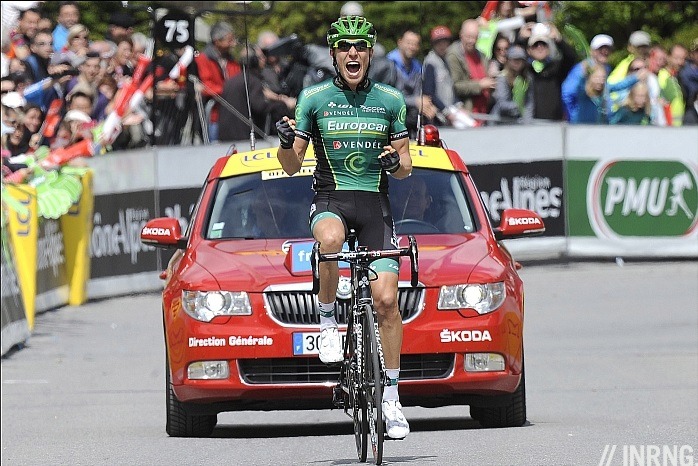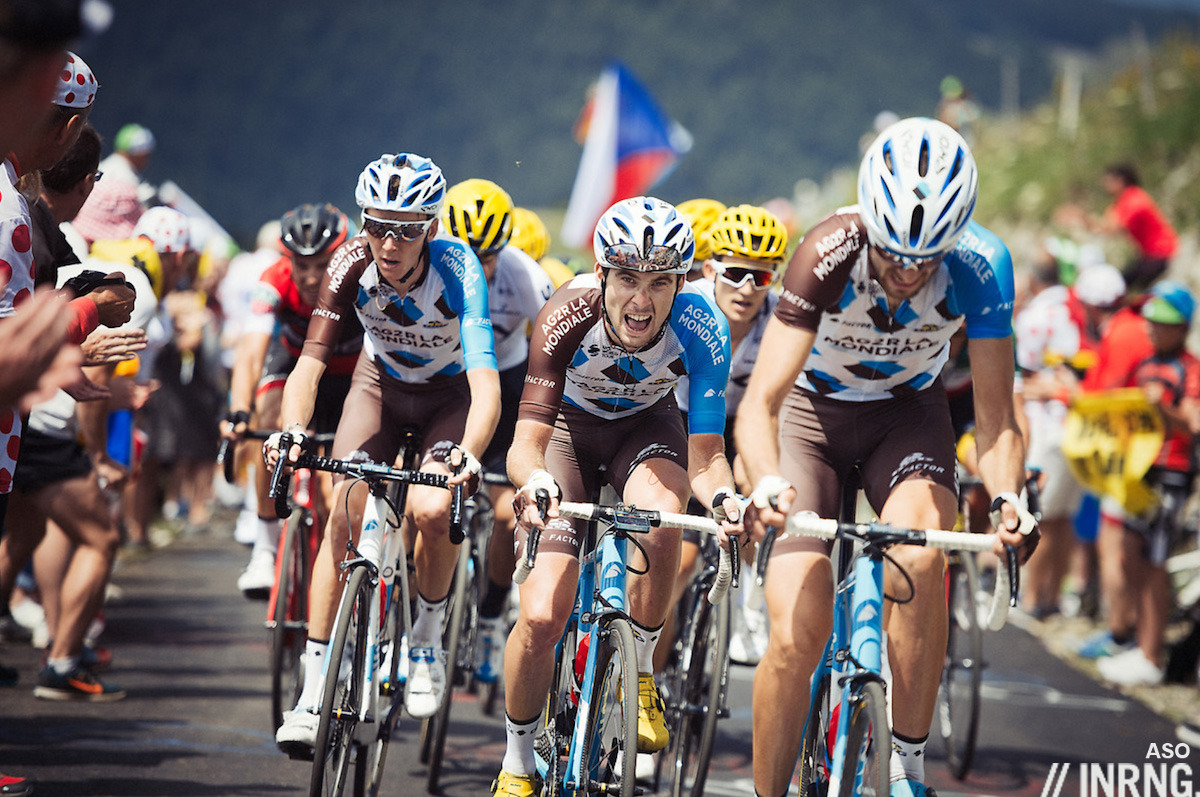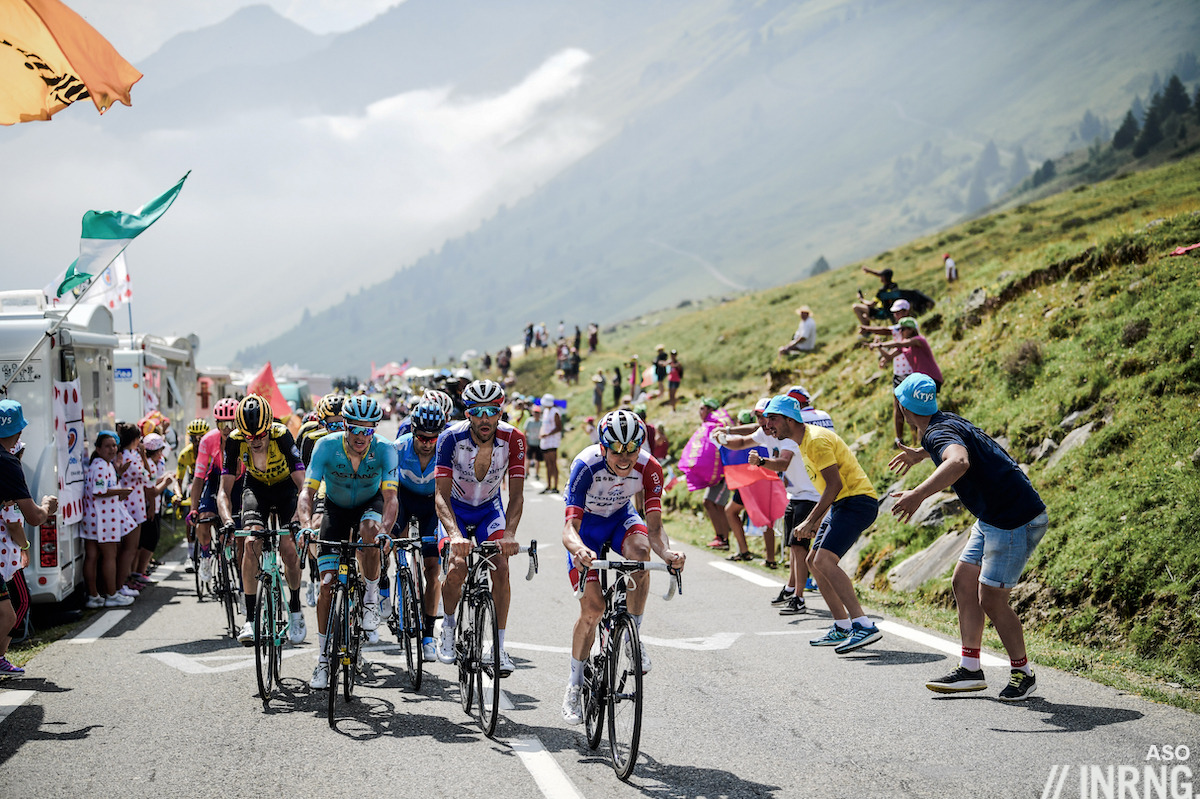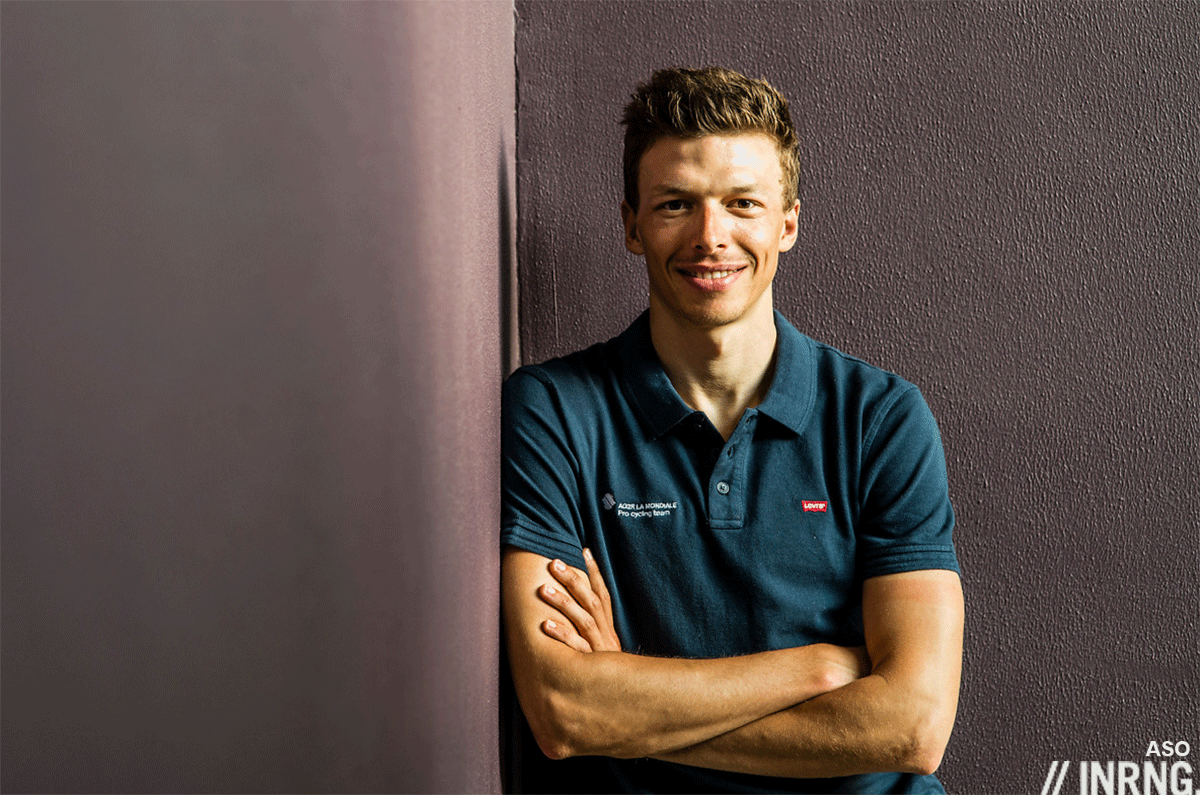For years French teams faced a headwind in the shape of high payroll taxes but this system is now rewarding them. Coupled with stable sponsors and home advantage when it comes to hosting the Tour de France, the three French squads in the World Tour are in a stronger position these days relative to their rivals.
It might have been the first bit of transfer gossip this year: Oliver Naesen was linked with a move to CCC. Put aside concerns that what the team really needed was a star for the Tour de France or a reliable sprinter rather than the third prong of a classics trident alongside Greg Van Avermaet and Matteo Trentin; and that Michał Kwiatkowski could join the following year making it an even more crowded move… all this is on ice with the CCC team looking likely to vanish at the end of the year. Title sponsor CCC, or Cena Czyni Cuda which translates as “the price makes wonders”, saw its stock price look less than wondrous well before the Covid-19 crisis so the company was under pressure to cut costs and having three cycling teams (CCC, CCC-Liv in the Women’s World Tour, plus CCC Development) looks luxurious, even if the company founder and chairman is a keen cyclist. Enforced shop closures in Poland and beyond have compounded the company’s problems although the company’s stock price has more than doubled in recent weeks which might buy the teams some space. Anyway, Naesen re-signed with Ag2r La Mondiale on a safe three year deal.
Today we get the news that Thibaut Pinot, David Gaudu, Stefan Küng and Arnaud Démare have extended their contracts for three more seasons with Groupama-FDJ. It’s hard to imagine they and their agents were keen to move elsewhere but still, all have stayed and on three year deals when two is the standard rate. We’re in non-standard times, having a contract for 2021 is security, even more so if it’s with a team that’s certain to exist next year too.
There’s no news chez Cofidis today but they haven’t cut rider wages during recent weeks. You feel for management who signed Elia Viviani on a big deal, including hiring his brother, and granted him permission to have a go at the Tokyo Olympics… only to have him sat at home for much of the year and making fresh plans for Tokyo next year instead of focussing on that elusive Tour de France stage win. Some Cofidis riders were placed into “partial unemployment”, a French government scheme that temporarily covers wages but those doing online races and other “work” were considered to be doing their job in full and so kept on the books in full. The same story at Ag2r La Mondiale and Groupama-FDJ were no wages have been cut or gone unpaid.
There’s a premium with the three French world tour teams at the moment: stability and security. Cofidis is a credit company owned by a large mutual insurance company; Ag2r La Mondiale is a large mutual insurance company; Groupama is a large mutual insurance company… and FDJ is the French national lottery, recently privatised but for now no change in sponsoring and marketing and committed to supporting sport until the Paris 2024 Olympics. So four big companies behind three teams and all with long term sponsorship plans behind.

Some of this good is down to good fortune, sponsors come and go and today’s ones are reasonably risk-free in a pandemic. Remember the Europcar team? The car hire company quit the spot and has been fighting in recent weeks to avoid bankruptcy following the travel bans. But part is structural, nationality counts here as the sponsors know better than most what they’ll get in terms of exposure given familiarity with the Tour de France, their home market. Also for years French teams have faced an additional headwind with high payroll taxes in France meaning to hire a rider on, say, a million Euro contract, cost a French team more than another team, to pay a rider the same sum net of taxes cost more. Italian teams faced similar problems and shopped around, it’s why Lampre was quietly run out of an address in Switzerland and at times the Bardiani and the Willier/Vini Fantini/Southeast team were technically registered as Irish and British teams. But French teams stayed registered in France even if it meant paying more. Now this is starting to pay off like an insurance policy, an expensive one but it puts the French squads in a strong position when a rider is weighing up their options this summer, do they sign with a squad that might not exist next year or go with one that will
Trouble ahead?
The pro rider market reaches an equilibrium of sorts each year, although in recent years the direction has been up and up every year. Just the possibility of F1 driver Fernando Alonso starting a cycling team was enough to make wages jump a few years ago but now we’re in the reverse scenario where CCC look to be going. If so this will bring the World Tour back down from 19 teams to 18 and where we were this time last year but with several star names coming back on the market. Manageable. However if one or two more teams go then they’ll be a tipping point where wages could fall substantially. The loss of a couple of World Tour teams could be handled by 16 World Tour teams in a revised UCI system where the likes of Arkéa, Circus, Wanty, Bardiani or Total Direct Energie get to ride more races but promoting these small will fill spots on the start line but won’t bring in new money: there’s no more price tension to pull up rider wages.

Conclusion
A three year deal? Nice in boom times, even better during a pandemic and recession. So far the French teams are faring relatively well thanks to generous sponsors and a home advantage of the Tour de France. Those high payroll taxes have been a headache but helped finance a system that makes the teams look like employers of choice at the moment. Relative is the key word, combine Ag2r La Mondiale and Groupama-FDJ’s budgets and you’re still millions of Euros short of Ineos. Still once upon a time budget squads like Bahrain-Merida and Astana might have poached talent from the French teams, these days they’re slashing wages, that is if they can meet the wage bill in the first place. It’s a question of nuance, Ag2r La Mondiale, Groupama-FDJ and Cofidis are mid-ranking teams by most measures and this won’t be changing too soon, it’s just they’re looking more resilient to the crisis for now. It’ll be interesting to see the effects on the market in the coming months, do riders sign with stable teams even if it means a wage cut from today, how can agents weigh up the credit worthiness of a team? There’s a lot riding on the coming months.



Good to be on those teams. But I bet they wish they could transfer in a tour winner
They would maybe prefer having a French rider coming second in the Tour to having a foreign rider winning, as demonstrated by years of loyalty to Bardet, Pinot… Viviani, as top man and top salary at Cofidis, is an exception but then he’s hardly a potential Tour winner, or second! Naesen and Frank are at AG2R but as aid in French stage races and as potential winners in others. Kung and Reichenbach are in a similar position at Groupama-FDG. Arkea-Samsic are the exception with Quintana and entourage, though for UCI points and because he provides the reliability Barguil lacks.
French riders are worth more than an equivalent foreign rider at French teams which gererally have a more French than international client and fan base
Those fracking socialists, how dare they show the face of a safety net in these uncertain days. Paying taxes is for pussies.
/s
Good for them. So someone have anything to give towards the super-wealthy if this beautiful sport gets going again.
Perhaps just to give some sense of perspective on this, it may be interesting to find out how many of the sponsors actual companies (not the teams themselves) either made staff unemployed or put them in a furlough scheme during the lockdown.
But that aside, I’m struck by a feeling of irony; Inner Ring’s conclusion paragraph can almost read like a post-Tour fans’ wish list – reduced teams, more wild card invitations, less money and wages, a possible reduced drain of talent from the less-well funded teams.
If ASO and the UCI can’t get Ineos, maybe the lockdown can?
Could not agree more. The sustainability of the ecosystem (and the excitement of following the sport) could actually improve by cutting the gowth spending (the old prune juice tale). The biggest issue is always less well paid team staff members and 2nd and 3rd tier teams survivorship that could actually improve.
I don’t mean this as a criticism of any bodies else’s words its just my take on it.
I know what you mean but I don’t really consider lower wages a good thing even if it levels the playing field. Likely hood is it will not even the playing field. Big teams that don’t suffer much effect will go ahead more if half the weaker teams fold or struggle for the next year or 2. And its mainly the more fragilely supported teams which seem to be in trouble (not the bigger ones).
These athletes have a limited time at the top and deserve whatever they can get for years of hard work for low pay with no real certainty that it will pay off. If the teams are not making a loss then the money is not unsustainable because they obviously have it. If they get less sponsorship in the future the wages will go down but it does not make the current wages on the current financials unsustainable at the time they were made. Each year the teams will adjust the wages of new contracts based on what they have available.
If there is less money to go around the richer teams will still be richer. They will still get the best riders on average across there squad. It will make no difference after a year or 2 and salaries had adjusted to a sponsorship. Biggest difference will be that the weaker teams can no longer have the finances for as much support staff.
The only way to have a even playing field is a highly policed salary cap. As much as anybody I hate the dominance of team ineous which there massive budget they spend on there TDF team mainly. Without it I expect we would have had some different TDF winners but I dislike any measures or circumstances which reduces wages as unfair on those earning those wages even more.
@Brent Sword – just be clear, I wasn’t necessarily pushing forward my comments as ideas I may agree with. Merely an ironic take which tickled me slightly on IR’s conclusion.
And I am not in favour of a salary cap either.
Sorry – pedantic, and you’ve not written badly, so likely and aberration, but ‘likelihood’. Phew, got that out of my system.
Seems to be a light at the end of our racing tunnel. The fog of covid clears a bit as summer unfolds.
Even most of the French PCT teams (Delko, Arkea, Total) must feel like a safer haven than many of the WT outfits. Only B&B, linked to tourism and travel, can expect to have major revenue loss.
What happens to riders on multi-season contracts (say Estaban Chaves of MTS) if a team ceases to operate before the rider contract terminates. Does the contract become null, and in effect worthless? Is the rider entitled to a negotiated settlement? Does the team have the obligation to pay in full?
If the team’s vanished there’s little to sue for but the rider can first make a claim on the UCI bank guarantee but often teams quitting seem not to meet their last three months of wages because the guarantee can cover that. Riders can also go to the sponsors and others behind the teams, often team owners will make good on their exit, eg Katusha’s effectively paying for some of Israel Cycling’s riders.
Very interesting, especially the fact that Makarov pays a lot of his former riders while they’re wearing the ICA-shirt. Do you, by chance, have any source for further information on that?
Thank you.
No, it was from memory but could be wrong… perhaps thinking instead of the Aqua Blue team where the owner covered the wages of riders who went there, Conor Dunne comes to mind.
Don’t really see how the high social security taxes in France are linked to the fact that French WT teams’ backers are large insurance companies/lotteries? Wouldn’t a team still be better off if backed by a large company/lottery in a country with lower tax rates? For instance, what rates are Movistar or Lotto-Soudal paying?
Also, I do wonder how solvent the insurance companies will be in the longer term, once all the Covid-related claims start coming in…
Still, good news for AG2R and Groupama-FDJ.
The sponsors at the moment is different, just that they’re reasonably stable at the moment. The tax system then is separate, it’s keeping riders paid in full. Combined these factors could be significant some riders weighing up offers in the coming months.
Do French soccer (football) teams get any tax breaks which cycling does not?
Nothing obvious, it’s a regular complaint from French teams that several French clubs (except Monaco which is exempt) can pay more in taxes than an entire foreign league. Paris SG pay more than Serie A, La Liga and the Bundesliga combined.
It was a major complaint for years that Monaco were able to pay players relatively a lot more than the other ‘real’ French teams due to their tax haven status. It’ll still be the same but PSG have blown them and everyone else out the water.
I think what IR is saying is
https://www.youtube.com/watch?v=l0zaebtU-CA
Any excuse for a fine tune 😀
Major French stadia (such as PSG’s home ground, Parc des Princes) are often owned by local government, which is a form of state support. And PSG also get an enormous state subsidy, it’s just that it’s the Qatari state subsidising them, rather than the French.
As for their tax bill, if you will double the world record for a transfer fee…
Football in the UK has a long and disreputable history of using the tax system as its emergency bank. Winding up orders on teams usually come from the tax authorities.
Cycling may be international, a big part of its appeal, but each team has to be based somewhere so it’s only right for each one to respect the local laws and social contract implicit in them. Quick money is not usually good money.
I’m not sure about your comment about football teams using the tax system as an emergency bank.
A well run institution doesn’t get into financial trouble, but when a company goes into administration or liquidation the revenue is the prime creditor. On the winding up order the Revenue gets its tax, and then anything left over goes to other creditor, so there’s no ‘using the tax system as an emergency bank’.
Agreements maybe be made with HMRC to finalise any tax fee, or potentially set aside some of the tax burden (with a view to keeping the business an OGC). But that is it. No money is lent.
I would say the issue with football clubs have been sharp practises over structuring of remuneration and contracts to put players fees out of reach of the U.K. tax system. But successively the Revenue have been closing these off (in the U.K., Spain and elsewhere).
It maybe true that cycling teams have invested in similar structured schemes to reduce social security and also reduce employment factors (as employment has higher administrative and tax costs) which may not be entirely correct. Someone recently suggested that the cyclists would not be employees, but if that were true then the teams would be in trouble with HMRC sooner or later (and likely elsewhere) as a domestique by their very nature and name is an employee – and excepting team leaders is likely to draw short shrift too.
I interpreted Plurien’s comment as an observation that when English football clubs are short of money, they often fall behind with payments to HMRC and use that money to pay staff, other bills, etc, hoping to catch up again later.
Back to cycling… I’m pleased that the French teams who’ve been at a financial disadvantage by their country’s tax regime for years are now seeing some apparent benefits. They’re good for the sport.